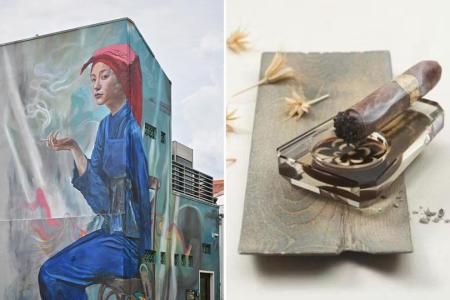Teatime: We doubt eating 'cigar' rolls can trigger smoking
This is part of a weekly column in which we talk about anything under the sun
Remember the saga of the samsui woman mural and the debate ignited by a single, controversial cigarette?
One might expect such a public discourse to encourage nuanced perspectives and measured responses.
Yet, a recent incident involving crab meat rolls suggests that when it comes to public sensitivities, a sense of déjà vu persists.
Local restaurants Peach Blossoms and Tasty Court recently earned the ire of the Health Sciences Authority (HSA) for serving crab meat rolls designed to resemble cigars.
While the details regarding the number of complaints remain undisclosed, HSA confirmed that public feedback prompted its action, demanding the removal of these culinary creations from the menus.
We can all agree on the importance of Singapore’s anti-smoking efforts but it’s worth pausing for a moment to consider the situation at hand.
Is a realistically-rendered food item, served within the context of a meal, truly capable of undermining anti-smoking efforts?
Can we definitively say that such culinary presentations pose a genuine risk of normalising smoking?
The irony becomes even more apparent when we compare this to the samsui woman mural saga.
Back then, after much public debate, the Urban Redevelopment Authority ultimately acknowledged that a historically accurate portrayal, cigarette and all, was no reason for artistic censorship.
So, why the inconsistency?
Why is a realistic depiction of a historical figure deemed acceptable in one instance, while a touch of culinary creativity is deemed objectionable in another?
Perhaps what's needed is a more transparent approach to addressing such public concerns.
Open dialogue involving regulatory bodies, stakeholders and the public can help navigate the complexities of individual sensitivities and broader societal values.
Fostering a culture that embraces both creativity and responsibility requires careful consideration, not knee-jerk reactions.
Let's hope that future incidents will be met with a renewed commitment to open discussion and measured responses, ensuring that good intentions don't inadvertently stifle innovation and critical thinking.
After all, shouldn’t we be striving for a society that values both thoughtful regulation and creative expression?
Get The New Paper on your phone with the free TNP app. Download from the Apple App Store or Google Play Store now



